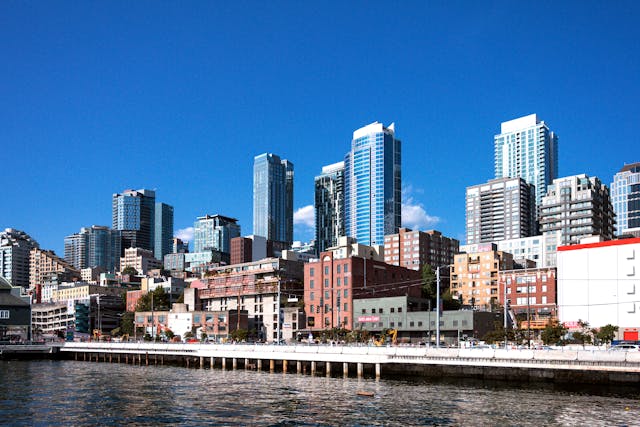May 24th, 2024

Thanks to its academic status and thriving innovation scene, Boston is considered one of the top business hubs on the East Coast. In particular, the city and the surrounding areas have become the destination of choice for many startups, not only due to the availability of talent and funding, but also given the quality and diversity of office accommodation options.
In this article, we offer detailed insights into the cost of renting office space in Boston, district by district.
Office market trends in Boston
Over the past decade, the Boston office space market has seen fluctuating performance, witnessing shifts in demand and supply. Initially, the growth of the tech and life sciences sectors contributed to the expansion of the office market, with the development of new and modern spaces that could accommodate the requirements of these occupiers. Low vacancy levels translated into increasing asking rates, in particular in areas like East Cambridge and Sommerville, while other tenants were pushed out of the market as they couldn’t always compete with the budget of occupiers like MIT, Novartis, and Google.
Read the rest of this entry »
Tags: Boston, Business Advice, commercial property, Commercial Real Estate, Office Market Trends, Office Rental, Office Space Trends and Forecasts
Posted in Boston, Business Districts, CBD's, CRE, Market Overviews, Office Planning, Office Space Forecasts and Trends | No Comments »
Add to: Del.icio.us | Digg
February 11th, 2022

Notable Office Market Insights
- Ongoing recovery is the main theme, continuing the trend seen in most office markets throughout 2021.
- Positive absorption indicators.
- Slight increase in rental rates.
- Marked differences in occupancy levels, vacancy rates and general performance from city to city.
- Remote working practices are still commonplace in key markets, such as San Francisco.
- 142 million square feet of office space currently under construction.
Lease Rates & Asking Rents
Recent data from Commercial Edge outlines a nationwide rental listing rate average of $38sq/ft in January 2022. These figures may be seen as somewhat inflated due to the number of high quality spaces currently listed due to being vacant, with Class A workspaces being listed at much higher prices.
According to Avison Young, Q4 average rental prices per square foot in gateway markets were as follows:
Read the rest of this entry »
Tags: Boston, chicago, Commercial Real Estate, Dallas, dc, Florida, Houston, Los Angeles, Manhattan, new york, office market report, Office Market Trends, Office Space, Office Talk, San Francisco, Texas, USA
Posted in National Market Reports, Office Space Forecasts and Trends, Office Talk, Real Estate, Trends and Statistics | No Comments »
Add to: Del.icio.us | Digg
February 11th, 2021

With a market size of nearly $900bn, the United States has one of the world’s largest commercial real estate markets, coupled with some of the most desirable business locations to match. This post serves as the first part of our examination into the US market’s performance based on data from Q4 2020 and Q1 2021.
Read the rest of this entry »
Tags: 2021, Boston, Dallas, dc, new york, philadelphia, San Francisco, vacancy and supply, Washington
Posted in Best Cities for Business in the USA, Boston, Dallas, DC, Manhattan, New York, Office Space Forecasts and Trends, Philadelphia, San Francisco, Trends and Statistics, Washington | No Comments »
Add to: Del.icio.us | Digg
February 12th, 2015
 The city of Boston has histrorically had a reputation for its international ports and its textile manufacturing industry. Manufacturing in general has dropped in the US over the years, however while the textile manufacturing industry still remains very strong in Boston, other industries have become more dominant in the last 20 years, and Boston continues to be a viable economic center that is still experiencing growth.
The city of Boston has histrorically had a reputation for its international ports and its textile manufacturing industry. Manufacturing in general has dropped in the US over the years, however while the textile manufacturing industry still remains very strong in Boston, other industries have become more dominant in the last 20 years, and Boston continues to be a viable economic center that is still experiencing growth.
Major Industries in Boston
The economy in Boston has seen a shift away from textile manufacturing and more towards technology manufacturing and service industry jobs. The major industries in Boston can be broken down into the urban industries and the suburban industries. In the city of Boston itself, the primary industries are finance and professional services. The city also contains much of Boston’s technology manufacturing as well.
The suburban areas of Boston rely primarily on technology manufacturing and national defense. The outlying areas of Boston are populated with a wide variety of skilled technical workers and military bases. Read the rest of this entry »
Tags: Boston, Business Advice
Posted in Boston, Business Advice, Business Spotlights | No Comments »
Add to: Del.icio.us | Digg
February 24th, 2012
5. Eugene, Oregon
Eugene, Oregon, is in the top five for a number of reasons, but the biggest of these reasons has to do with electricity. The city of Eugene gets almost half of its electricity from renewable resources. Most of western Oregon gets around 34% of its energy from hydroelectric dams, but Eugene takes things a step further by adding on 9% from wind farms. The city’s water utility– EWEB– even buys back excess energy produced by residential solar arrays.
4. Oakland, California
The city of Oakland, in the state of California, has been long-heralded as one of the most forward-thinking cities in the US on the environmental front, and that has helped to drive new technologies in Oakland. The most impressive of these technologies are the hydrogen-powered buses that roam the streets. These buses have significantly cut down the pollution in the city, and have helped to develop this technology into a more economical form.
3. Boston, Massachusetts
Boston has a highly developed public transit system, as well as an impetus toward innovation and new technologies. This is highly evidenced by the unique system that Boston is implementing to help produce methane for generators. They are using bacteria within residential glass clippings to produce the methane. This is a fuel source that is readily available, and which would only be going to waste otherwise. Modest projections state that the system has the potential to create enough methane to power 1.5 megawatts of electricity. At the end of the composting cycle, the grass and leaves will have turned into a source of fertilizer that can be used for residential or farm fertilizer.
2. San Francisco, California
San Francisco, California, is another of the cities with a highly developed transportation sector. Public transportation is a large part of how people get around here, and it has a significant impact on the air quality and health of the people living here. Also, San Francisco has one of the most aggressive large-scale photovoltaic projects in the country, with massive potential for both environmental and financial benefits.
1. Portland, Oregon
Portland, Oregon, is the most eco-friendly city in the United States. While it lags behind other cities in terms of energy and electricity, it blows past them on things like public transit and green construction. 35 buildings in Portland are certified by the U.S. Green Building council, and a quarter of workers in Portland commute by bike or public transit.
Tags: Boston, California, Eco Advice, eco-friendly, environmental, Eugene, green construction, hydrogen-powered buses, Massachusetts, Oakland, Oregon, portland, public transit, public transport, renewable resources, San Francisco, state, USA
Posted in Cities & States, Eco Matters | No Comments »
Add to: Del.icio.us | Digg



